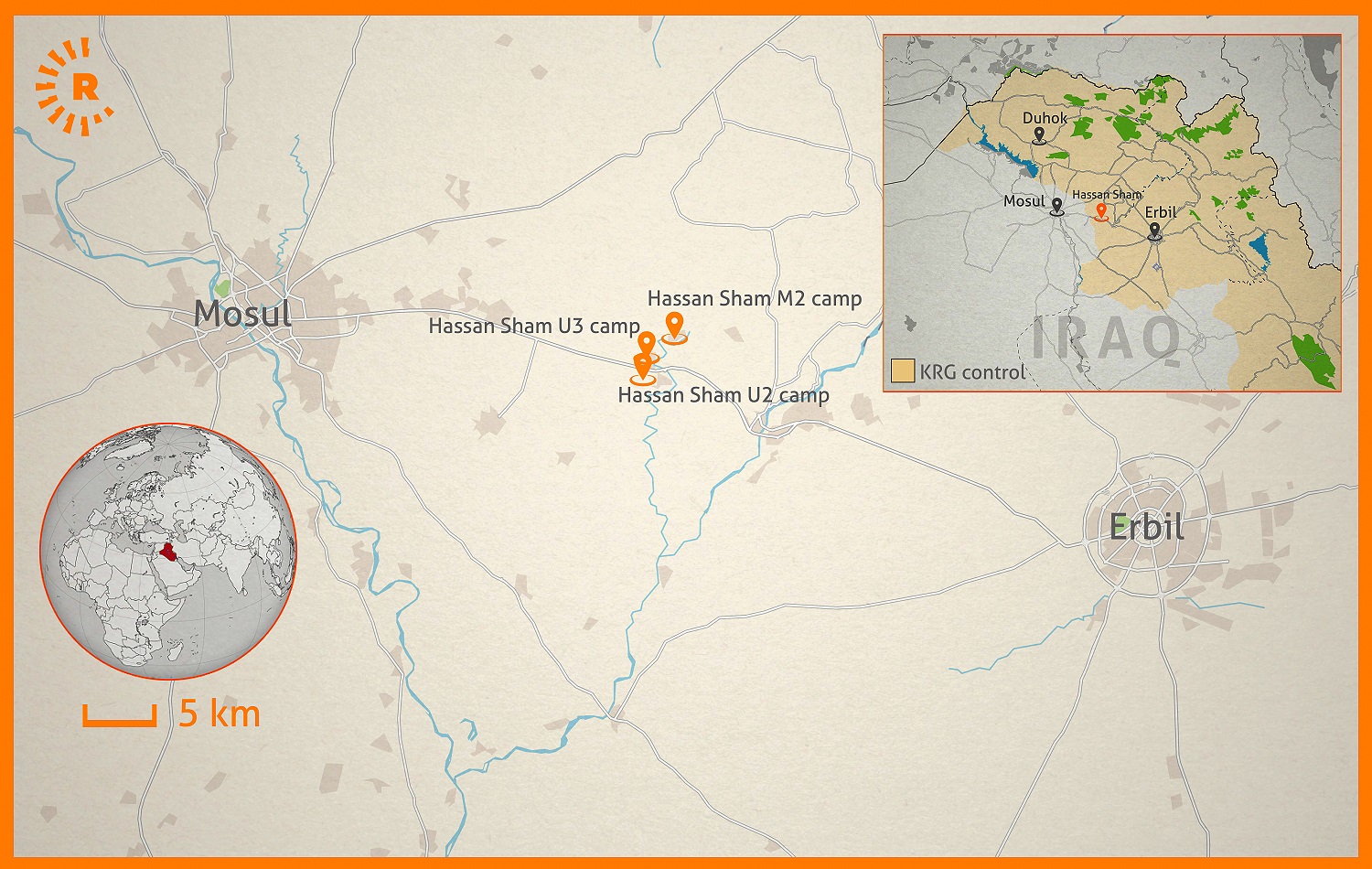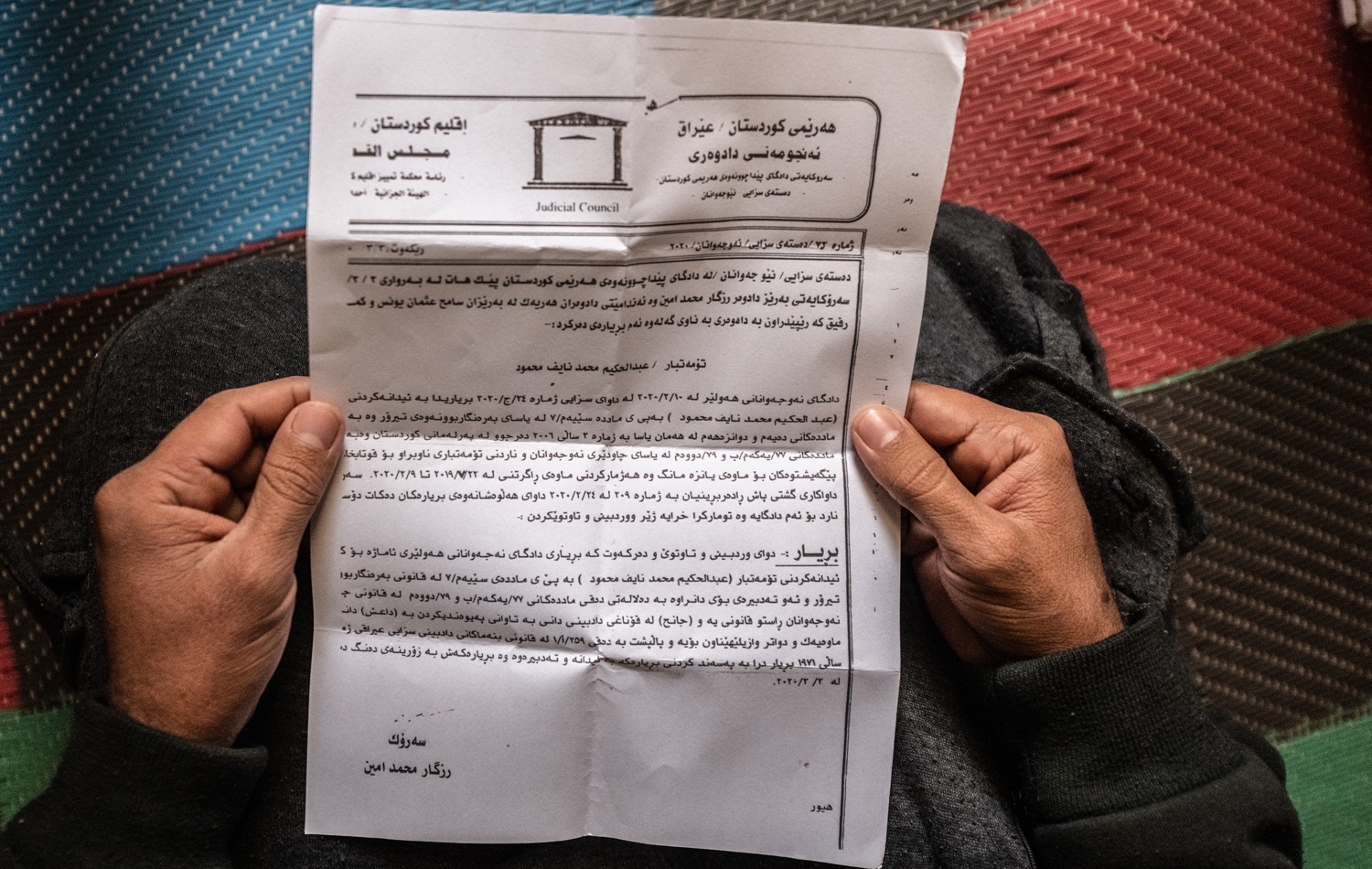
A woman stands in her temporary housing unit home at Hassan Sham U3 camp, Nineveh province on November 26, 2020. Photo: Bilind T. Abdullah/ Rudaw
HASSAN SHAM CAMP, Iraq — “We’ll have to throw ourselves into the River Zab, so that we can all just die and be done with it,” jokes Khalid Ali Abbas, who sits in a tent with several other despondent men. Where they are now is "neither heaven nor hell", he says.
Dark jokes can be all you have when life has dealt you so many short straws. Khalid, originally from Fallujah in Anbar province and a father to six sons, fled the Islamic State (ISIS) stronghold of Mosul in 2016. He moved from town to town in western Iraq, then illegally travelled into Syria and Turkey with four of his sons, before heading to the Kurdistan Region alone in 2018.
Though Hassan Sham camp is just within the confines of territory under the control of the Kurdistan Regional Government (KRG), it is also in Nineveh, a province mostly under federal Iraqi control. For Khalid and the roughly 5,700 other people displaced from Nineveh province now living at Hassan Sham U3 camp, going back home – be that somewhere under the control of the Iraqi Security Forces, or the Popular Mobilisation Forces (PMF, or Hashd al-Shaabi) – does not feel like an option. Some, like Khalid, say they have tried to return, but with disastrous results.
“The minute I go back there, they [the PMF] tie my hands, they tie my legs, take my fingerprints,” issuing him papers saying “you bombed this place and that place,” says Khalid, who asserts that the only crime he committed was “illegally crossing the border.”
Official narratives on the delay of returns, three years after the territorial defeat of ISIS in Iraq, are that the Nineveh towns and villages the camp residents come from are yet to be demined and reconstructed. However, human rights organisations have alleged that the predominantly Arab, predominantly Sunni camp residents are being used as pawns in a game of territory played by the governments of Iraq and the Kurdistan Region.

Abdulhakim Mohammed Naif, 22, is a former ISIS member from the village of Bazwaia, east of Mosul. He is the oldest of five children – two sisters and three brothers.
Abdulhakim was brought up in desperate poverty, forced to work from the age of 11 to provide for his family. That poverty drove in to join ISIS in 2014 as a teenager. “We were hungry,” he said. “They would give us a small amount [of money].”
He fled ISIS after just two months. Five days after he left, ISIS militants visited his home to demand his return to the group, so he fled Bazwaia for Mosul, where his uncle lived. He worked in a detergent factory still upright amid the ruin of Mosul. In 2019, he made his way to the Kurdistan Region, but was arrested at a checkpoint on the outskirts of the city of Erbil on suspicion of terrorism and imprisoned for 11 months.
Abdulhakim left prison in February 2020 for Hassan Sham, where he now lives in a state of purgatory.
“I can’t go back, nor can I go into the Region,” he said, because he has “no official document.”
Like others who have served terms in prison, Abdulhakim was handed a release form by the Kurdistan Regional Government (KRG). But he said that the Iraqi government refuses to accept the release form as valid, putting men like him at risk of 15 to 20 years’ imprisonment back home for actual or alleged ISIS membership.

Abdulhakim is regretful of the decision he said he made in desperation.
“If I hadn’t joined them I'd have been at work with my cousins and brothers now,” he said.
Among the other former Kurdistan Region prisoners living at Hassan Sham is Abdulkarim al-Jibouri, a 33-year-old from Mosul imprisoned in Erbil for ISIS membership after deserting the group in 2016. Fearing re-arrest and detention if he went back to a part of Iraq controlled by the central government, he settled at Hassan Sham upon his release from prison.
“We have neighbours and relatives who were killed when they went back, or were sentenced to 20 years in prison [for ISIS membership],” Abdulkarim said.
“We have around 300 people released from KRG prisons who can’t go home nor go back, because they will be arrested sometimes for 20 years or killed at the checkpoints,” Rashid Darwesh Safti, a senior, province-wide camp manager for Erbil told Rudaw English. Safti also said that the Iraqi government considers the Kurdistan Region’s law-rendered documents invalid.
“Whatever they do, or don’t do, they are considered ISIS,” Safti said. “At the checkpoints they disrespect and hurt them a lot, sometimes sexually assault [the women], so they come back.”
“They use psychological warfare against them,” Safti said, for being “families of ISIS” and “Sunnis”.
According to camp manager Mevan Siddiq, around 319 families are from the village of Hassan Sham – within sight of the camp – and are unable to return home because the village has yet to be reconstructed, and its soil is still littered with mines left behind by the ISIS war.
But some residents of the camp who have tried to leave have alleged that they have been stopped from doing so for a long time, according to a Human Rights Watch (HRW) report from September 2019, which accused the KRG of blocking Hassan Sham residents from returning to their home villages because of territorial disputes between the governments of the Kurdistan Region and Iraq. “We’ve been following this particular group of people since 2016, we’ve engaged with the government multiple times asking them why they can’t return,” Belkis Wille, a senior researcher with the Conflict and Crisis division at HRW told Rudaw English on Monday.
“What we ultimately are told over and over again is that the only way these people are going home is if there’s some kind of political settlement between Baghdad and the Kurdistan Region,” Wille said. “These people are unfortunately sort of against their knowledge being used as political pawns in a stalemate between Baghdad and the Kurdistan Region.”
In October 2020, six years after the advance of ISIS left millions of residents of northern and western Iraq displaced, Iraq’s Ministry of Migration and Displacement announced it would be accelerating its shutdown of camps in central government-run territory, still home to hundreds of thousands of Iraqis, by the end of the year. Camps in provinces including Anbar, Nineveh and Salahaddin have already been closed down. The UN and international NGOs have expressed worry about the hastiness of camp closures, but the government has continued to press ahead.
The KRG doesn’t appear to be planning the mass closure of its camps – home to over 200,000 Iraqi IDPs, according to the KRG’s Joint Crisis Coordination Centre (JCC), with another 500,000 IDPs living in urban communities – though it continues with its years-long push for voluntary returns.
“Our policy is to support and facilitate voluntary return of IDPs to their place of origin,” KRG’s Minister of Interior, Reber Ahmed said during a meeting in Baghdad on December 2 with federal government officials and international organisations on the return of displaced people.
“With this policy, we have been able to help facilitate the return of 700,000 IDPs to their place of origin since 2016, and we have been able to close down or merge 23 camps in Kurdistan,” he added.
Since the beginning of 2020, around 26,503 refugees and IDPs from the KRG have voluntarily returned to their homes, according to JCC statistics that run up to October of this year.

At the camp’s art centre for children, 17-year-old Sarab Salim Salih learns embroidery and watches over the younger kids.
Sarab, from Hammam al-Alil south of Mosul, is the only member left of her immediate family. She lost both of her parents young, and in quick succession. Her mother committed suicide in 2003, when she was a newborn. Her father, a soldier in the army, died in an explosion while on duty in 2007.
A four-year-old Sarab was taken in by her aunt, where she was able to lead a childhood of relative normality – until ISIS militants raided their home one day in 2016, kidnapping her aunt before her very eyes. Sarab’s aunt was killed, body discarded in the middle of nowhere, grieving relatives called to retrieve her body. To her doom, Sarab was taken in by her uncle, who married her off to a member of ISIS when she was just 13. “He always beat me,” Sarab said, scars on her broken nose and face still visible. “He destroyed my life, destroyed everything, and my studies.”
Three years into the marriage, Sarab’s husband was arrested for ISIS membership after one of her cousins reported him to the authorities. She filed for divorce as fast as she could.
Sarab bore four children, her first when she was 14 years old. She aborted one child herself, and gave birth to two stillborns. Sarab’s only surviving child, 18-month old Omer, was taken away from her by her former husband’s family. Omer is the only thing Sarab misses about home.
In February 2020, on the pretext of going to hospital to see a doctor, Sarab ran away from home, her uncles, her cousins, for good.
Sarab now spends her time taking computing lessons at the camp and goes to the art centre twice a week, both to learn and to teach the children.
“I don’t remember anything good or pleasant about home, except for beating and disaster, my life is better now” Sarab said. “I’m here on my own, I have no problems, no one beats me and I’m comfortable.”
But on her wrists were dried lines of blood, evidence of her attempted suicide the week earlier.
“I have depression, I don’t regret it and I don’t feel anything,” she said calmly. “I go to the art center and to the computing lessons because if I sit and do nothing I’ll kill myself.”
Limited psychosocial services available at camps, but in areas people are returning to, including Mosul, there lacks a coordinated push for the provision of even the most basic services – let alone specialised mental healthcare for people who have been through so much. And for people like Sarab, a young divorcee with little in the way of a support network, return can only mean going back to a house of neglect.
“I don’t want to go back,” Sarab said. “No one treated me well.”
With reporting by Zozan Sadoon








Comments
Rudaw moderates all comments submitted on our website. We welcome comments which are relevant to the article and encourage further discussion about the issues that matter to you. We also welcome constructive criticism about Rudaw.
To be approved for publication, however, your comments must meet our community guidelines.
We will not tolerate the following: profanity, threats, personal attacks, vulgarity, abuse (such as sexism, racism, homophobia or xenophobia), or commercial or personal promotion.
Comments that do not meet our guidelines will be rejected. Comments are not edited – they are either approved or rejected.
Post a comment